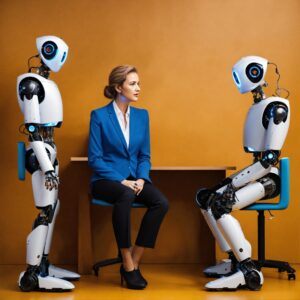Last updated on March 21, 2024
How AI robot is different from humans : AI Robots Versus Humans
Artificial Intelligence (AI) and robotics have revolutionized various industries, from manufacturing to healthcare, with their remarkable capabilities. However, despite advancements in AI technology, there remains a clear distinction between AI robots and human beings across a spectrum of scenarios. In this article, we delve into the fundamental differences between AI robots and humans, exploring their unique characteristics and limitations in different contexts.

Read More Article CLICK HERE
1. Cognitive Abilities:
AI robots excel in tasks requiring rapid computation, data processing, and pattern recognition. They can analyze vast amounts of data in a fraction of the time it would take a human, making them indispensable in fields such as data analysis, financial forecasting, and scientific research. However, AI’s cognitive abilities are narrow and specialized, lacking the holistic understanding, intuition, and emotional intelligence inherent to humans.
Humans possess cognitive flexibility, creativity, and the ability to adapt to novel situations. They can navigate complex social dynamics, understand subtle nuances in communication, and make judgments based on ethical considerations and empathy. These cognitive traits enable humans to excel in roles that demand creativity, emotional connection, and moral reasoning, such as counseling, leadership, and artistic expression.
2. Emotional Intelligence:
One of the most significant distinctions between AI robots and humans lies in emotional intelligence. While AI can recognize and simulate emotions to a certain extent through sentiment analysis and facial recognition algorithms, it lacks genuine emotional experiences and empathy. Human emotions are complex and multifaceted, influenced by personal experiences, cultural upbringing, and social interactions.
Humans can empathize with others, understand their perspectives, and respond with compassion and kindness. This emotional connection fosters trust, collaboration, and meaningful relationships, which are essential in professions like healthcare, counseling, and customer service. AI robots, on the other hand, may mimic empathy based on predefined algorithms but cannot truly comprehend or experience emotions.
Read more Article CLICK HERE
3. Physical Dexterity:
AI robots are designed for specific physical tasks, ranging from assembly line automation to surgical procedures. They possess precision, speed, and consistency, enhancing productivity and efficiency in various industries. However, AI robots lack the dexterity and adaptability of the human body, limiting their ability to perform tasks in unstructured environments or tasks requiring fine motor skills and sensory feedback.
Human beings exhibit remarkable physical capabilities, including agility, coordination, and sensory perception. They can manipulate objects with precision, navigate complex terrains, and adapt to unforeseen obstacles in real-time. These physical attributes enable humans to excel in roles that demand manual dexterity, such as craftsmanship, sports, and rescue operations, where improvisation and intuition play crucial roles.
AI robots operate based on programmed algorithms and rules, devoid of moral agency or ethical judgment. While AI can assist in decision-making processes by analyzing data and predicting outcomes, it lacks the capacity for moral reasoning and ethical reflection. Humans, on the other hand, possess moral autonomy, the ability to discern right from wrong, and act according to ethical principles and values.
Human morality is shaped by cultural norms, philosophical beliefs, and personal conscience, allowing individuals to navigate complex moral dilemmas and make ethical decisions in ambiguous situations. This moral agency is essential in professions such as law, governance, and humanitarian aid, where decisions impact the well-being and rights of individuals and communities.
In conclusion, while AI robots have revolutionized industries with their computational prowess and automation capabilities, they remain fundamentally different from humans in various scenarios. Humans possess cognitive flexibility, emotional intelligence, physical dexterity, and moral agency, enabling them to excel in diverse roles that require creativity, empathy, adaptability, and ethical judgment. Understanding these distinctions is crucial for harnessing the potential of AI technology while recognizing the irreplaceable qualities that make us uniquely human.






[…] How AI robot is different from humans ?By Krishna SahuHow AI robot is different from humans : AI Robots Versus Humans Artificial Intelligence (AI) and robotics have revolutionized various industries, from manufacturing to healthcare,… Leave a Comment […]
[…] How AI robot is different from humans ?By Krishna SahuHow AI robot is different from humans : AI Robots Versus Humans Artificial Intelligence (AI) and robotics have revolutionized various industries, from manufacturing to healthcare,… Leave a Comment […]
[…] How AI robot is different from humans ?By Krishna SahuHow AI robot is different from humans : AI Robots Versus Humans Artificial Intelligence (AI) and robotics have revolutionized various industries, from manufacturing to healthcare,… Leave a Comment […]